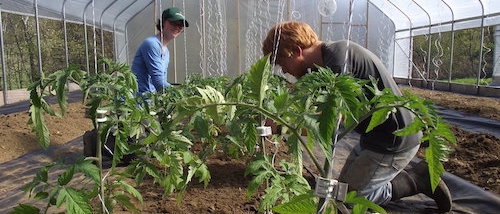This article was originally published in the March 2021 issue of Growing for Market Magazine.
I first met Maya Kosok of Hillen Homestead in Baltimore, Maryland, when I visited her house back in February of last year before COVID. I’d been hired to facilitate four farmer study circles in the Maryland/Virginia/Washington D.C. region. Maya and a group of women farmers who already knew each other jumped at the chance to have an official study circle. I met them that fine winter day.
Maya lives in a cute row house in Baltimore City with her husband and two small children. This was not my usual farm visit, that’s for sure. No farm to be seen at all, just a bustling urban setting. The Baltimore study circle of six women farmers met monthly on Zoom throughout the rest of 2020. I got to know more and more about Maya’s flower business. But mostly, I became increasingly impressed with this energetic, knowledgeable, can-do urban grower.
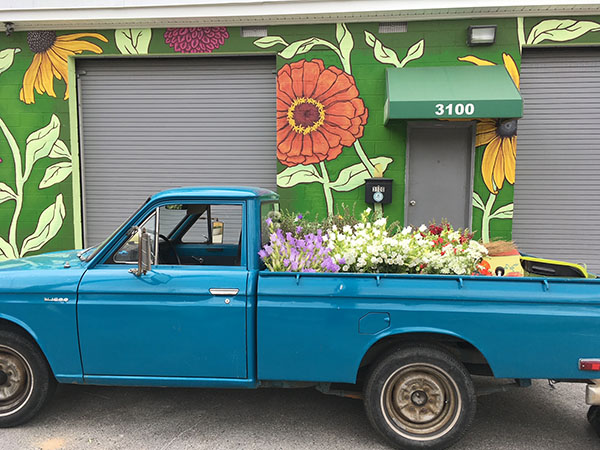 The Hillen Homestead Datsun pickup.
The Hillen Homestead Datsun pickup.
Maya grew up in the DC suburbs, studied history at Temple University in Philadelphia, and taught environmental education at a teaching farm in Northern California before settling in Baltimore in 2011 with her then-fiancé, now-husband. Her first job in Baltimore was as an AmeriCorps community coordinator for the urban Real Food Farm.
While working with other urban growers, she saw an opportunity for greater collaboration so she became the first coordinator of the Farm Alliance of Baltimore, an urban farmer co-op. Maya secured grants and provided a stable guiding hand to enable the co-op to set up a small greenhouse, to share tools and knowledge and to begin selling as a co-op at a city farmers market.
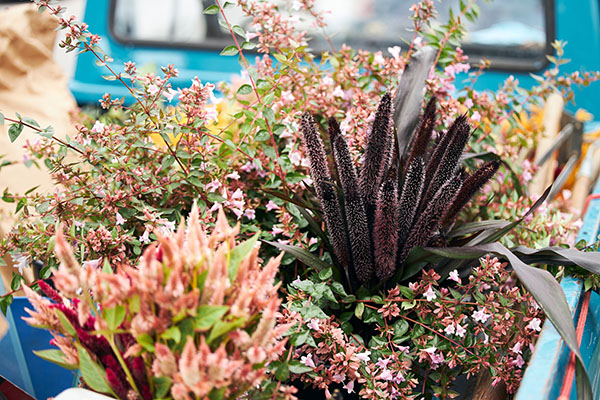 Bunches in the back of the pickup. Photo by Brian O'Doherty.
Bunches in the back of the pickup. Photo by Brian O'Doherty.
Through her work, she met Ellen Frost of Local Color Flowers, a pioneer of supporting and promoting local flowers. Many of Ellen’s flower growers were aging out, and she told Maya she would buy every stem she could grow. Thus, began Maya’s wholesale cut flower business. She started with a shared lease on a tiny vacant lot owned by the city and made $2,500 in sales her first year. Maya was hooked and Hillen Homestead was born.
I visited her oddly shaped corner plot in a quiet residential area last October. It is a jam-packed combination of annuals, herbaceous perennials and fruit trees on nearly every square foot. There’s a tiny tool and supply shed that Maya leaves unlocked. Lots of wood chip mulch and landscape cloth keep weeds at bay. The plot sits high above a major roadway with wild messy trees and vines threatening to take over. I was amazed by the variety of thriving plants: plenty of peonies, willows, baptisia, lots of hardy heirloom mums, even cherry tomatoes which Maya clipped for that day’s harvest. This garden produces bounteous blooms.
 Ornamental kale. Photo by Brian O'Doherty.
Ornamental kale. Photo by Brian O'Doherty.
I asked Maya about the open tool shed and vandalism. Her stance is to be generous to any and all who pass by. She offers plants and cut flowers easily and often. She welcomes neighbors to forage figs when they ripen (she sells the young fruiting branches for $2.50 a stem). The closest neighbors keep an eye on the garden when Maya isn't there. The shed remains unlocked so that it doesn’t invite break-ins. It’s been a positive experience so far. Maya is charming and giving. That’s the key.
Next, I followed Maya’s cute-as-a-button 1972 turquoise Datsun pickup across town to her second garden site on Hillen Street. This garden is in a denser urban neighborhood. The area is not affluent. The Hillen garden was once five-row houses that burned down in the 1990s. When Maya adopted it eight years ago, it was covered with rubble. Now, it’s overflowing with beautiful flower beds and fruit trees.
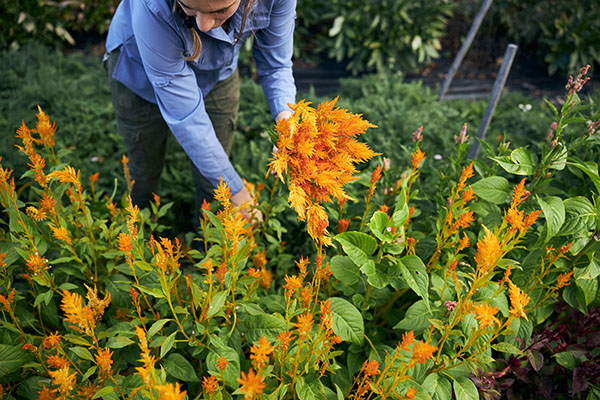 Maya harvesting celosia. Photo by Brian O'Doherty.
Maya harvesting celosia. Photo by Brian O'Doherty.
Maya navigates the balance between efficiency and reality with aplomb; instead of fencing off the garden to keep pedestrians from cutting through, she incorporated a path in the design. The message is “come on through and enjoy the view.” Maya welcomes neighbors and passersby to engage with her and to take home a few blooms or to pick a few blackberries. She is warm and gracious, and she’s cutting thousands of gorgeous flowers from this patch every month.
So far, no real vandalism has occurred, just some trash left behind. Last year a van accidentally jumped the curb and drove through a corner of the garden and hit the house next door. Maya is gardening here by choice. It’s not the only plot available. She considers the social context. She’s creating something beautiful in a disinvested area. She’s engaging anyone who is interested and being respectful of the neighborhood and its history. Maya’s abundance mindset is the core of her worldview. She helps other growers, gives flowers away, and always smiles. She’s living her values and experiences the ripples of reciprocity.
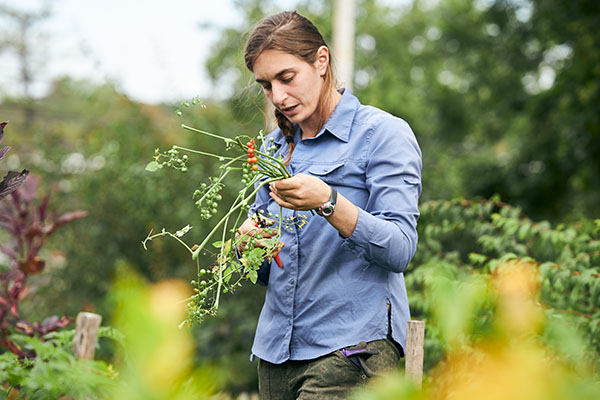 Maya harvesting cherry tomatoes for bouquets. Photo by Brian O'Doherty.
Maya harvesting cherry tomatoes for bouquets. Photo by Brian O'Doherty.
Up next, we headed to Maya’s home neighborhood. We parked in front of Motzi Bread bakery across the street from her house. It’s owned by Maya’s friends and features handmade sourdough bread from locally sourced grains. Maya uses a corner of their back storeroom for her tiny cooler and workspace. It was a gorgeous day, so Maya and her employee Samantha set up tables on the sidewalk to assemble bouquets for the weekend farmers market. As if on cue, folks walking by stop. “Wow, such beautiful flowers. Where did they come from and where are the bouquets going?” Maya entertained them one by one and explained how her business works.
How’s this all working out business-wise? Swimmingly. Maya flower farms part-time while she juggles managing several properties, nonprofit consulting, and parenting two small children with a husband who is a primary care provider for people experiencing homelessness in Baltimore. Maya launched her business while pregnant and nursing, twice. She learned early that she can’t be an attentive parent while working in the garden. So various forms of childcare, including grandparents, support her success.
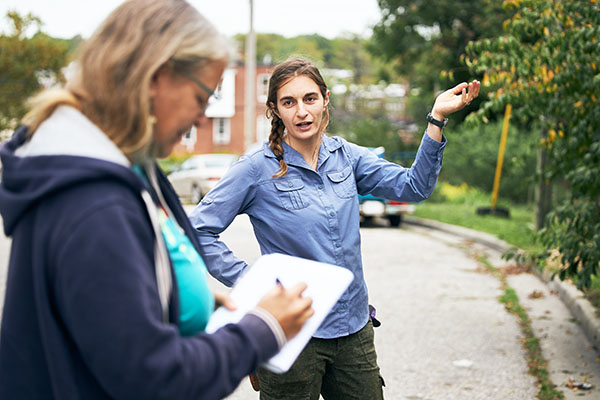 The author interviewing Maya at one of her lots. Photo by Brian O'Doherty.
The author interviewing Maya at one of her lots. Photo by Brian O'Doherty.
She had gross sales of over $100,000 last year from a quarter-acre of ground plus some urban foraging. She figures she works just over half-time and earns $25 an hour for her labor. She pays two part-time employees $15 an hour and planned to increase wages this season. Each year Hillen Homestead has grown in both gross sales and net profit. Since Maya is the main grower, her largest expenses are supplies. Her land access and water costs are negligible, allowing for a business with almost no overhead costs. Maya is resourceful, hardworking, and has a well-developed network of growers, friends, and customers.
Maya is indeed a social creature. There are so many people interwoven into every aspect of her business. She teams up with nearby Two Boots Farm to jointly sell and deliver flowers to Washington, DC, florists twice a week. She continues to be part of the Farm Alliance of Baltimore, where she serves on the board of directors and takes a turn working a collective farmers market stand every eight weeks. She’s part of the farmer study circle where I met her. To expand her spring offerings, she buys and resells peonies from a grower farther south who lacks direct access to florists. And on and on.
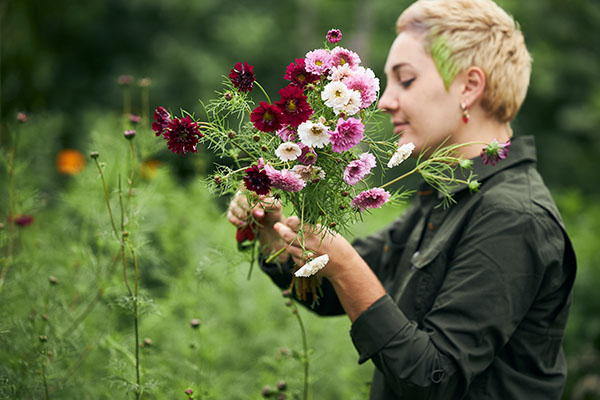
Photo by Brian O'Doherty.
Over the years, Maya has shaped her business to suit her young family. She took a risk in the summer of 2019 and suspended cutting and selling flowers from August to October to bike across South Korea and Japan with her family. She had time with her kids out of school and fully stepped away from growing. Not only did her business not suffer, it actually improved. Summer is slump time in the florist business in the mid-Atlantic. Knowing she was taking time off, she pushed even harder for robust spring production that year and learned how high demand was. Last year, she shifted her entire production to spring and fall, and the numbers were better than ever.
Speaking of numbers, Maya keeps very close tabs on her business finances. She’s dang good at Quickbooks. She’s a huge fan of Airtable, a collaborative software platform. At a study circle meeting, she demonstrated its flexibility and intuitive aspects. Maya has created a massive file where she tracks all her many species and varieties along with planting and harvest times.
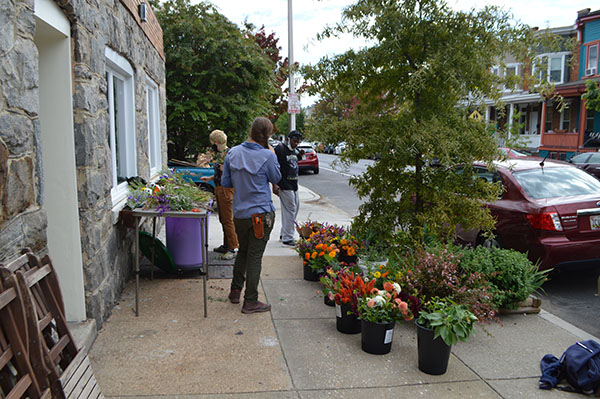 Making bouquets by Motzi Bread in Baltimore. All images by the author except where noted otherwise.
Making bouquets by Motzi Bread in Baltimore. All images by the author except where noted otherwise.
She uses Airtable to send a weekly availability list to florist customers. Each product she sells has a photo, description, stem length, price and number of bunches available. Maya says, “They can’t actually order directly from the list (though with some extra effort one could set that up – it’s more complex for us to make an order form since Elisa and I are selling jointly.) But the key thing for me is I can very easily update it from the field on my phone as the availability shifts week to week.”
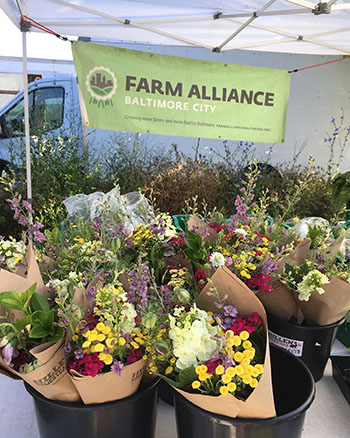 Selling products from the collective at a Farm Alliance of Baltimore market.
Selling products from the collective at a Farm Alliance of Baltimore market.
All told, I find Maya a remarkable businesswoman, grower, and citizen. She’s managed to interweave her call to service as a human with her hustle and drive to produce. Maya has created a beautiful, low-overhead business that satisfies her curiosity and social values. I am honored to call her my friend and colleague.
Ellen Polishuk farmed for 30 years at Potomac Vegetable Farms in northern Virginia. She now consults and teaches growers around the country through her business Plant to Profit, and as an associate at Kitchen Table Consultants. For more photos of each farm profiled, go to planttoprofit.com, and click on farm profiles.

